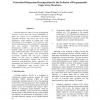Free Online Productivity Tools
i2Speak
i2Symbol
i2OCR
iTex2Img
iWeb2Print
iWeb2Shot
i2Type
iPdf2Split
iPdf2Merge
i2Bopomofo
i2Arabic
i2Style
i2Image
i2PDF
iLatex2Rtf
Sci2ools
110
click to vote
AHS
2006
IEEE
2006
IEEE
Generalized Disjunction Decomposition for the Evolution of Programmable Logic Array Structures
Evolvable hardware refers to a self reconfigurable electronic circuit, where the circuit configuration is under the control of an evolutionary algorithm. Evolvable hardware has shown one of its main deficiencies, when applied to solving real world applications, to be scalability. In the past few years several techniques have been proposed to avoid and/or solve this problem. Generalized disjunction decomposition (GDD) is one of these proposed methods. GDD was successful for the evolution of large combinational logic circuits based on a FPGA structure when used together with bi-directional incremental evolution and with (1+λ) evolution strategy. In this paper a modified generalized disjunction decomposition, together with a recently introduced multi-population genetic algorithm, are implemented and tested for its scalability for solving large combinational logic circuits based on Programmable Logic Array (PLA) structures.
| Added | 10 Jun 2010 |
| Updated | 10 Jun 2010 |
| Type | Conference |
| Year | 2006 |
| Where | AHS |
| Authors | Emanuele Stomeo, Tatiana Kalganova, Cyrille Lambert |
Comments (0)

